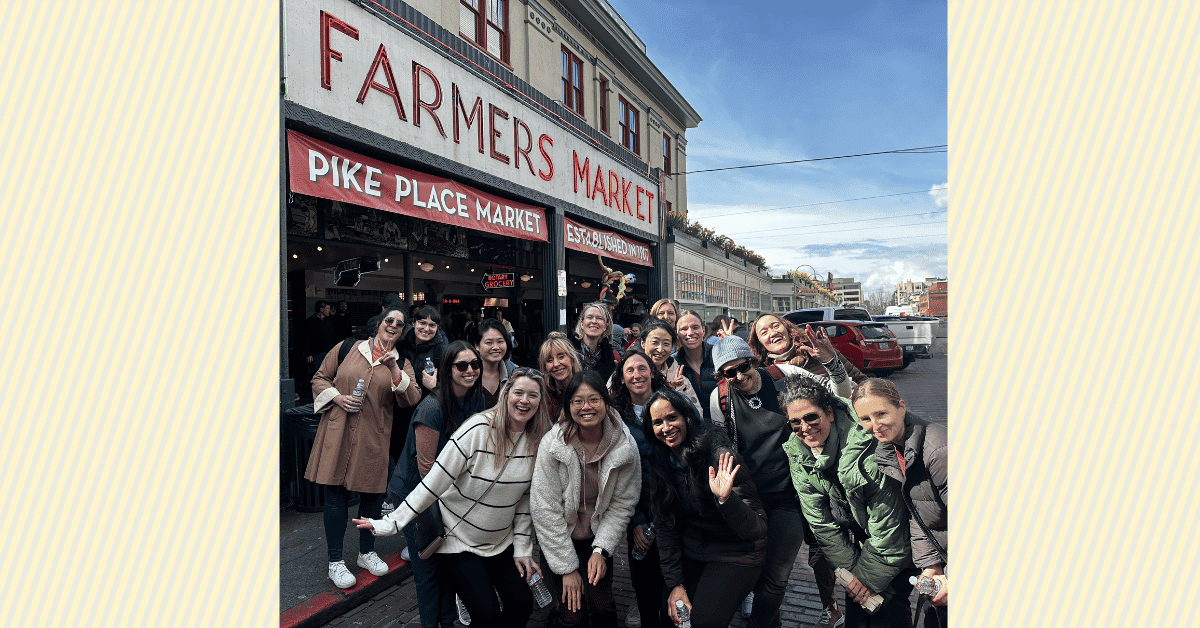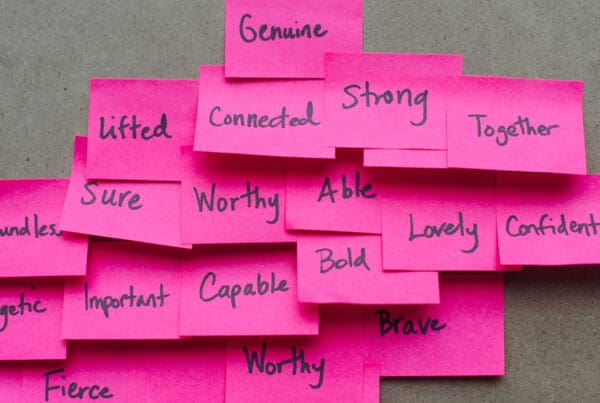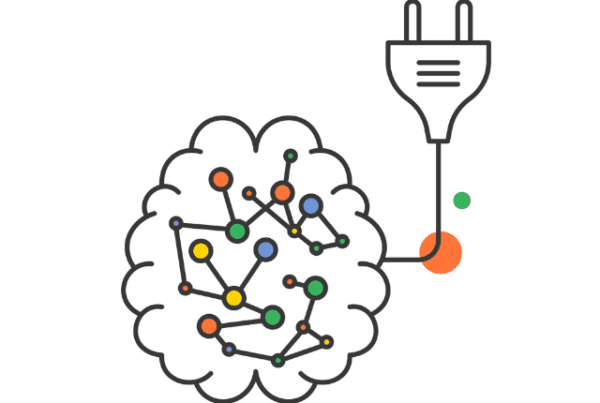Across UW Medicine, colleagues are focused on team care to support the well-being of our community. From classes in the ancient Chinese practice of Qigong to Breaking Bread team dinners, here is a small snapshot of team care and connection initiatives funded by UW Medicine’s Well-Being Grants.
12:30 p.m. – Qigong Class, UW Medicine Primary Care at Northgate
It’s lunch time and Brenda Loew, DAOM, acupuncturist, Osher Center for Integrative Health, stands at the front of a staff breakroom with her hands on her abdomen. Colleagues have rushed in on their break and there’s a frenzied feeling in the air. But then the door closes, and Loew begins to talk about the benefits of Qigong — an ancient Chinese practice of slow, gentle movements and breathing techniques — and the mood in the room shifts. She leads the participants through a series of slow movements that push and pull the air and energy around their bodies. The hectic day is momentarily left behind.
UW Osher Center practitioners Loew and colleague Aiko Bailey, DACM, LAc, proposed the Qigong program to build camaraderie and encourage a culture of wellness. The low-impact exercise is approachable for most employees and can increase energy and reduce stress — perfect for a mid-workday break.
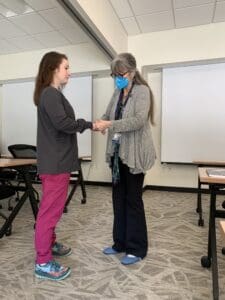
Brenda Loew doing hand microsystem work with Erin Baumbach
Loew was introduced to Qigong in the 1980s when she began East Asian medical and martial arts studies but had let her Qigong practice lapse. The stress of losing her partner, finishing a doctorate degree and the pandemic brought her back to Qigong.
“Qigong immediately shifts how I feel,” Loew says. “I’m grateful for the Well-Being Grant because it’s allowed me to bring the power of this ancient art of movement and breathing with mindfulness to our hard-working UW team members.”
One of those people is Erin Baumbach, a certified medical assistant and a former service member.
“I have injuries from being in the military. I appreciate integrated medicine to improve one’s physical and mental health. I don’t have to take time off from work to have this moment to breathe, which improves how I feel and makes me the best for my patients,” says Baumbach.
The Qigong program ran for three weeks initially. Loew and Bailey collected feedback forms from each class to evaluate the participants’ progress and make evidence-based recommendations for continuing the Osher program.
1 p.m. – Wellness Massages, Outpatient Social Work, UW Medical Center – Roosevelt
A perfect day might be ten minutes of Qigong at the Northgate Clinic followed by a midday massage at UW Medical Center – Roosevelt. The UW Medical Center’s Outpatient Social Work team is focused on the latter.
Kendra Koeplin, one of the managers for ambulatory care in UW Medical Center’s Social Work and Care Coordination department, recognized an opportunity for team care.
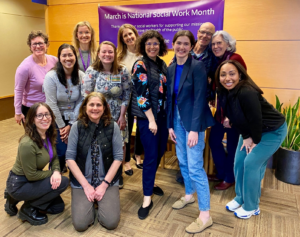
Outpatient Social Work Team, UW Medical Center – Roosevelt
“I have the honor of working with a highly skilled team of dedicated social workers,” says Koeplin. “The team provided continuous support to patients through the pandemic. We also added new team members, many of whom had not met in person. Opportunities for community building were lost during the pandemic and due to full schedules, increased referral volumes and higher acuity patient care, our social workers were feeling disconnected and depleted.”
A Well-Being Grant supported a renewed focus on team care. The team was able to weigh in on activities meant to provide community building. Their first chosen activity was a massage day which, although an individual event, was a collective decision that led the way to planning other activities to connect and rejuvenate.
A massage therapist was scheduled, space was reserved, and team members provided care coverage for each other during the 20-minute massages.
“The bodies, minds and hearts of those caring for others’ needs are in need themselves to sustain in this profession,” says Koeplin.
A little self-care goes a long way. One social worker said of her massage, “The activity had a surprisingly big impact on my day. I wondered if a 20-minute massage could be that helpful, and it turned out to be enormously so. I quickly went from sympathetic nervous system tension to parasympathetic relaxation.”
2 p.m. – Pike Place Market Food Tour, Nutrition and Food Services, Harborview Medical Center
After a little Qigong, and a midday massage, lunch sounds good. The registered dietitians of Harborview took that route. Clinical nutrition manager Jen-Wei Liu, MS, RD, CD, organized a food tour of Pike Place Market.
“The tour helped improve the connection between the dietitians and strengthen their relationships,” Liu says. “It also was a way to show appreciation for everything Harborview dietitians have done for our patients.”
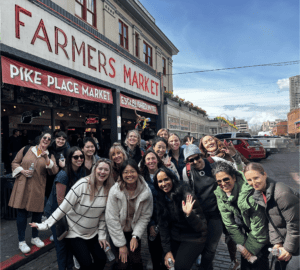
Harborview Medical Center Nutrition Services Team
Dietitians recommend food that will be beneficial depending on the disease state of the individual. The inpatient dietitians travel between patient rooms to make recommendations and provide education. They also make tube feed and Total Parenteral Nutrition (intravenous feeding) recommendations for those with limited oral intake. Outpatient dietitians see patients at the clinics and via telemedicine, making diet recommendations and tracking patients’ nutrition status.
The food tour was not just relationship-building between these hard-working dietitians but also informational. It increased awareness of local food resources since many of the samples are locally grown and made. Seventeen dietitians participated and enjoyed Japanese waffles, Greek-style gelato and homemade tortillas, among other items.
“We don’t want our staff to feel burned out,” says Liu. “Prioritizing the Pike Place Market food tour provided an opportunity for dietitians to connect with each other outside of the work environment and build closer relationships that translate into elevating our team spirit.”
5 p.m. – Cultural Celebrations, Medical Specialty Clinics, Harborview Medical Center
At Harborview’s Medical Specialty Clincs, eating, learning and team bonding are underway.
The clinics, comprised of Dermatology, Rheumatology and Occupational Therapy, have both a diverse staff and patient population. A series of monthly cultural awareness gatherings were implemented to promote an appreciation for the many cultures present in the building.
“We have 15 staff members from 10 countries serving as registered nurses, medical assistants, patient care coordinators and patient service specialists,” says assistant nurse manager Vinod Richard-Webber, BSN, RN.
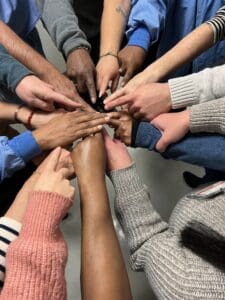
Harborview Medical Center’s Medical Specialty Clinics
With the Well-Being Grant, Richard-Webber purchases food representing various cultures and staff share a short presentation on their culture, values and beliefs.
“The staff went through many changes during the pandemic,” says Richard-Webber. “It was as if we were experiencing secondary trauma. The project’s goal is to celebrate one another and to bring the community together to help us heal.”
Thus far, the team has celebrated Indian, Vietnamese and Philippine cultures, as well as recognized Black History Month. The team has enjoyed learning about each other’s histories while trying new foods. Richard-Webber notes the Healthy People 2030 program supports participation in community activities to promote community pride and engagement.
“We work with vulnerable populations and it’s crucial that we take care of ourselves as employees,” says Richard-Webber. “We’ve had three cultural celebrations so far. Future grants could help us continue this program.”
6 p.m. – “Breaking Bread” Dinner, Emergency Medicine, Harborview Medical Center and UW Medical Center
As the day winds down, a small group of Emergency Medicine faculty are sharing a meal while discussing their experiences. The group is participating in “Breaking Bread,” an evidence-based program that provides space for groups of six to eight emergency medicine faculty members to meet and discuss their work challenges and successes. The intention behind the “Breaking Bread” dinners is to build community, cultivate a sense of meaningfulness and reduce feelings of isolation and burnout.
“Emergency medicine physicians across the country experience some of the highest levels of burnout among all specialties,” says Dave Lu, MD, MS, MBE, associate professor, Department of Emergency Medicine. “One of the predominant protective factors from burnout cited by emergency medicine clinicians was camaraderie within their community.”
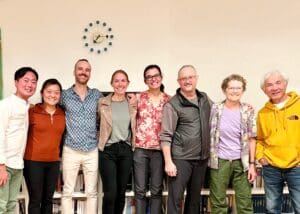
Breaking Bread Dinner with Emergency Medicine Faculty
The dinners bring together faculty at various career stages and across Harborview and UW Medical Center, giving colleagues who might not normally socialize an opportunity to connect and break bread together.
At the dinners, a prompt is given to support conversation, such as, “If you could give your younger self a piece of advice, what would it be?” Lu recalls that some of the responses to that specific prompt included: Being kinder and more forgiving to yourself when things aren’t going well; being more empathetic with patients and other healthcare workers; and pushing for solutions versus simply tolerating the daily frustrations.
“The Well-Being Grant supported these ‘Breaking Bread’ Dinners,” says Lu. “We’d love to keep these dinners going to continue to focus on team care.”
From one campus to the next, UW Medicine employees lead inspiring efforts that benefit our community. The projects highlighted here were funded by UW Medicine’s Well-Being Grants. In August 2023, 202 Well-Being Grants were awarded with $250,000 in donor funding. The grants support a wide range of projects focused on building community and improving the workplace environment and culture. Learn more about the Well-Being Grants program.
